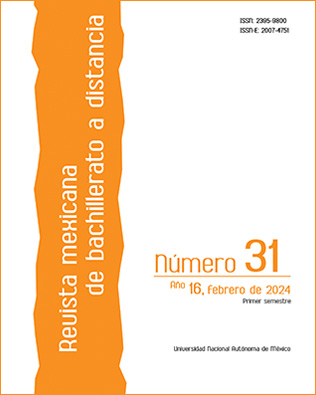Development of socio-emotional skills in high school: a case report
Main Article Content
Abstract
Social-emotional skills (SES) are crucial in aiding individuals to understand and regulate their emotions, foster empathy, build positive relationships, and make responsible decisions. This paper examines teachers' perceptions of an online teacher training program for the development of SES in the classroom. The curriculum design was structured using the ADDIE model (analysis, design, development, intervention, and evaluation), and the learning paradigm followed is constructivism. The course evaluation was based on qualitative feedback from participating teachers, who highlighted the program's usefulness in enhancing their classroom activities and pointed out challenges related to workload and the need for clearer communication of course objectives. Through the construction of a conceptual model, a continuous improvement cycle based on teacher feedback is proposed.
Article Details
Citas en Dimensions Service
References
Adler, A. (2016). Teaching well-being increases academic performance: Evidence from Bhutan, Mexico, and Peru. Publicly Accessible Penn Dissertations, 1572. http://repository.upenn.edu/edissertations/1572?utm_source=repository.upenn.edu%2Fedissertations%2F1572&utm_medium=PDF&utm_campaign=PDFCoverPages
Barría-Herrera, P., Améstica-Abarca, J. M. y Miranda-Jaña, C. (2021). Educación socioemocional: Discutiendo su implementación en el contexto educativo chileno. Revista Saberes Educativos, 6. https://doi.org/10.5354/2452-5014.2021.60684
Braun, S. S., Roeser, R. W., Mashburn, A. J. y Skinner, E. (2019). Middle school teachers’ mindfulness, occupational health and well-being, and the quality of teacher-student interactions. Mindfulness, 10(2), 245–255. https://doi.org/10.1007/s12671-018-0968-2
Celio, C. I., Durlak, J. y Dymnicki, A. (2011). A Meta-Analysis of the impact of service-learning on students. Journal of Experiential Education, 34(2), 164–181. https://doi.org/10.1177/105382591103400205
Fitzgerald, M. M., Shipman, K., Pauletic, M., Ellesworth, K. y Dymnicki, A. (2022). Promoting educator social emotional competence, well-being, and student–educator relationships: A pilot study. Mental Health & Prevention, 26, 200234. https://doi.org/10.1016/j.mhp.2022.200234
Kager, K., Mynott, J. P. y Vock, M. (2023). A conceptual model for teachers’ continuous professional development through lesson study: Capturing inputs, processes, and outcomes. International Journal of Educational Research Open, 5, 100272. https://doi.org/10.1016/j.ijedro.2023.100272
Kim, S., Raza, M. y Seidman, E. (2019). Improving 21st-century teaching skills: The key to effective 21st-century learners. Research in Comparative and International Education, 14(1), 99-117. https://doi.org/10.1177/1745499919829214
Larson, M.B. y Lockee, B.B. (2019). Streamlined ID: A Practical Guide to Instructional Design (2nd ed.). Routledge. https://doi.org/10.4324/9781351258722
Lave, J. y Wenger, E. (1991). Situated Learning: Legitimate Peripheral Participation. Cambridge University Press.
Milicic, N., Alcalay, L., Berger, C. y Álamos, P. (2013). Aprendizaje socioemocional en estudiantes de quinto y sexto grado: Presentación y evaluación de impacto del programa BASE. Ensaio: Avaliação e Políticas Públicas em Educação, 21, 645–666. https://doi.org/10.1590/S0104-40362013000400002
Molina de Colmenares, N. (2002). Inteligencia racional versus inteligencia emocional: implicaciones para la educación integral. Laurus, 8(14), 61-70. https://www.redalyc.org/articulo.oa?id=76111334005
Murrieta, P., Ruvalcaba, N. A., Caballo, V. E. y Lorenzo, M. (2014). Cambios en la percepción de la violencia y el comportamiento agresivo entre niños a partir de un programa de habilidades socioemocionales. Psicología conductual, 22(3), 569–584. https://bit.ly/47yLoh4
Nasa, P., Jain, R. y Juneja, D. (2021). Delphi methodology in healthcare research: How to decide its appropriateness. World journal of methodology, 11(4), 116–129. https://doi.org/10.5662/wjm.v11.i4.116
Oliveira, Í. M., De Castro, I., Silva, A. D. y Taveira, M. do C. (2023). Social-emotional skills, career adaptability, and agentic school engagement of first-year high school students. International Journal of Environmental Research and Public Health, 20(8). https://doi.org/10.3390/ijerph20085597
Pahl, K. M. y Barrett, P. M. (2007). The development of social–emotional competence in preschool-aged children: an introduction to the Fun FRIENDS Program. Journal of Psychologists and Counselors in Schools, 17(1), 81–90. https://doi.org/10.1375/ajgc.17.1.81
Pedrini, L., Meloni, S., Lanfredi, M. y Rossi, R. (2022). School-based interventions to improve emotional regulation skills in adolescent students: A systematic review. Journal of Adolescence, 94(8), 1051–1067. https://doi.org/10.1002/jad.12090
Pellerone, M., Martinez Torvisco, J., Razza, S. G., Lo Piccolo, A., Guarnera, M., La Rosa, V. L. y Commodari, E. (2023). Relational competence, school adjustment and emotional skills: a cross-sectional study in a group of junior and high school students of the sicilian hinterland. International Journal of Environmental Research and Public Health, 20(3). https://doi.org/10.3390/ijerph20032182
Secretaría de Educación Pública [SEP]. (2017). Planes de estudio de referencia del marco curricular común de la educación media superior. https://www.gob.mx/cms/uploads/attachment/file/241519/planes-estudio-sems.pdf
Sharp, P., Dolan, R. y Eldar, E. (2023). Disrupted state transition learning as a computational marker of compulsivity. Psychological Medicine, 53(5), 2095-2105. https://doi.org/10.1017/S0033291721003846
Trigueros, R., Sánchez-Sánchez, E., Mercader, I., Aguilar-Parra, J. M., López-Liria, R., Morales-Gázquez, M. J., Fernández-Campoy, J. M. y Rocamora, P. (2020). Relationship between emotional intelligence, social skills and peer harassment. A study with high school students. International Journal of Environmental Research and Public Health, 17(12), Article 12. https://doi.org/10.3390/ijerph17124208
Villaseñor, P. (2018, enero 8). La habilidad de desarrollar habilidades. Banco Mundial Blogs. https://blogs.worldbank.org/es/voices/la-habilidad-de-desarrollar-habilidades

This work is licensed under a Creative Commons Attribution-NonCommercial 4.0 International License.





